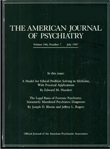Electrocardiographic effects of nortriptyline, phenelzine, and placebo under optimal treatment conditions
Abstract
The authors treated 44 outpatients 55 years old or older who were suffering from major depression with either nortriptyline, phenelzine, or placebo for 7 weeks. Plasma levels of nortriptyline were kept between 50 and 170 ng/ml, and platelet monoamine oxidase (MAO) inhibition in phenelzine-treated patients was kept between 70% and 80%. ECGs were compared before and after treatment. Nortriptyline produced statistically significant increases in both the heart rate and the PR interval, although none was outside the normal range. Phenelzine produced a significant decrease in the QT interval. None of the patients had pathological ECG changes under the closely monitored treatment conditions of this study.
Access content
To read the fulltext, please use one of the options below to sign in or purchase access.- Personal login
- Institutional Login
- Sign in via OpenAthens
- Register for access
-
Please login/register if you wish to pair your device and check access availability.
Not a subscriber?
PsychiatryOnline subscription options offer access to the DSM-5 library, books, journals, CME, and patient resources. This all-in-one virtual library provides psychiatrists and mental health professionals with key resources for diagnosis, treatment, research, and professional development.
Need more help? PsychiatryOnline Customer Service may be reached by emailing [email protected] or by calling 800-368-5777 (in the U.S.) or 703-907-7322 (outside the U.S.).



